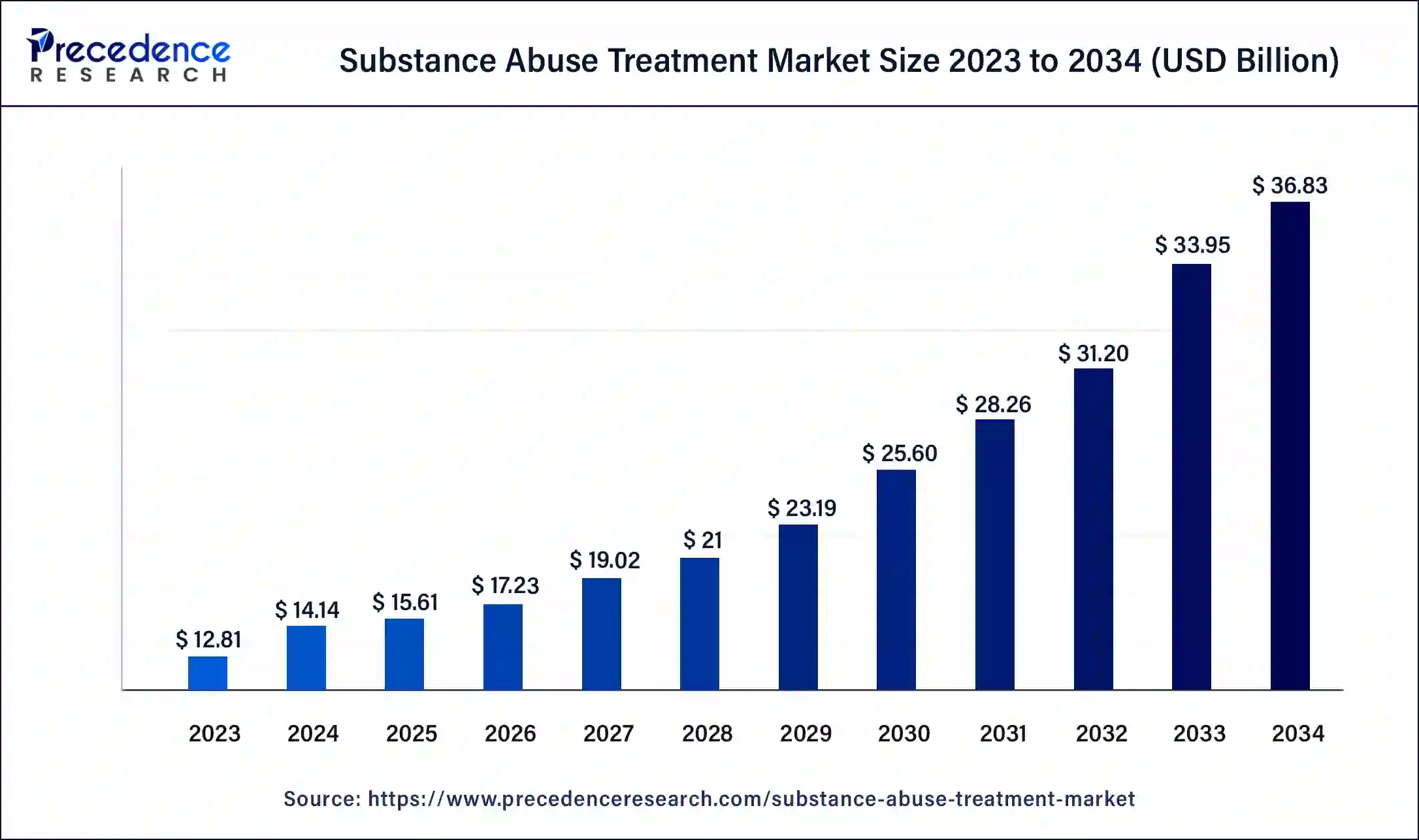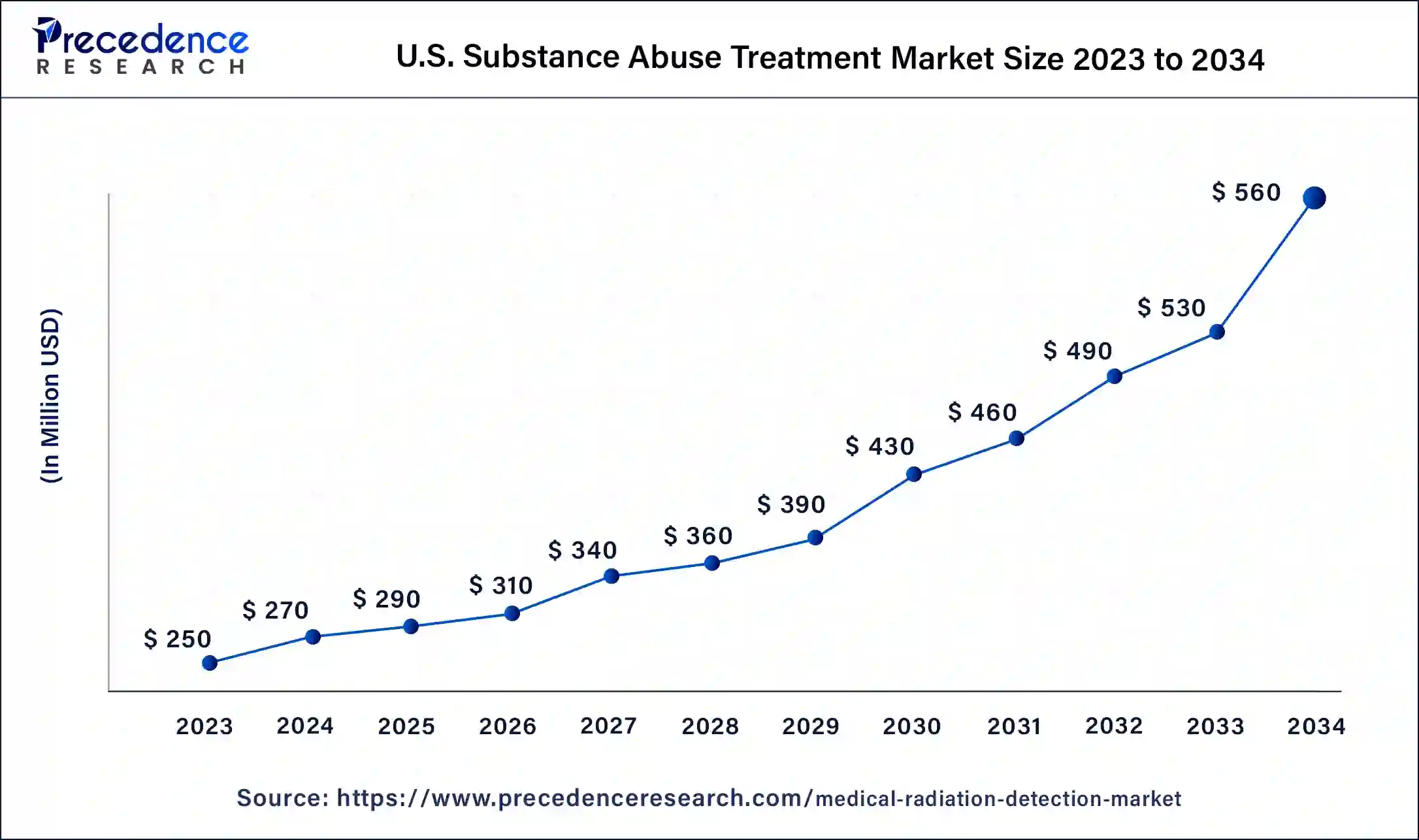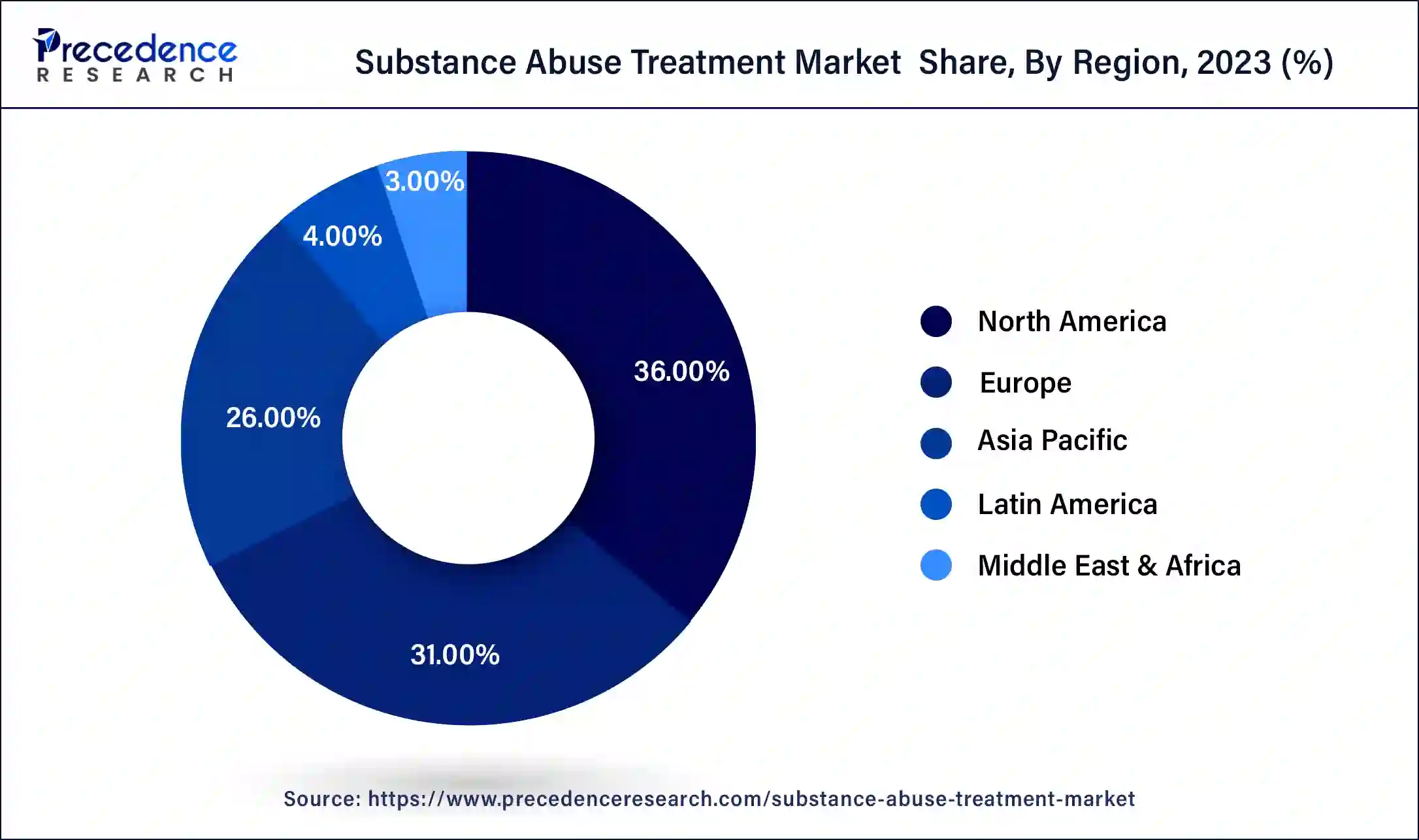November 2024
Substance Abuse Treatment Market (By Treatment Type: Tobacco/Nicotine and Vaping, Alcohol, Marijuana, Synthetic Cannabinoids, Prescription and Over-the-counter Medications, Others; By End-use: Hospitals, Clinics, Rehabilitation Centers, Others) - Global Industry Analysis, Size, Share, Growth, Trends, Regional Outlook, and Forecast 2024-2034
The global substance abuse treatment market size was USD 12.81 billion in 2023, calculated at USD 14.14 billion in 2024 and is expected to reach around USD 36.83 billion by 2034, expanding at a CAGR of 10.05% from 2024 to 2034.

Substance Abuse Treatment refers to a range of medical and therapeutic interventions aimed at helping individuals overcome addiction to substances like drugs or alcohol. It encompasses detoxification, counseling, behavioral therapies, medication-assisted treatment, and rehabilitation programs, all designed to promote recovery, prevent relapse, and improve overall well-being.
The U.S. substance abuse treatment market size was valued at USD 3.23 billion in 2023 and is estimated to reach around USD 9.49 billion by 2034, growing at a CAGR of 10.25% from 2024 to 2034.

North America has held the largest revenue share 36% in 2023. North America presents several noteworthy trends within the substance abuse treatment market. A prominent transformation involves the extensive adoption of evidence-based practices and the seamless integration of mental health services into addiction treatment protocols. The opioid crisis has triggered a renewed focus on implementing harm-reduction strategies and the utilization of medication-assisted treatment (MAT). Telemedicine and digital therapeutic solutions have risen to prominence, markedly enhancing treatment accessibility. Additionally, there is a growing acknowledgment of the significance of personalized and comprehensive treatment approaches, in line with the evolving preferences and requirements of individuals seeking substance abuse treatment services in the region.
Asia-Pacific is estimated to observe the fastest expansion In the Asia-Pacific region, the substance abuse treatment market is undergoing notable developments. There is a clear and noteworthy rise in awareness regarding mental health and addiction issues. This heightened awareness is translating into an increased demand for treatment services in the region. Telemedicine and digital health solutions are becoming increasingly popular, breaking down geographical barriers and enhancing treatment accessibility. Collaborations between governments and private healthcare providers are improving the overall treatment infrastructure. However, the stigma associated with addiction remains a persistent challenge in the region. Despite this obstacle, there is a noticeable shift towards adopting holistic and patient-centered treatment models, aligning with global trends in addiction care.

In Europe, the substance abuse treatment market has witnessed several notable trends. There is a growing emphasis on harm reduction strategies, including supervised injection sites and opioid substitution therapies, aimed at reducing the negative consequences of substance abuse. Additionally, telemedicine and digital health solutions have gained traction, improving treatment accessibility. The integration of mental health services with addiction treatment programs is another key trend, addressing co-occurring disorders. Furthermore, government initiatives and increased public awareness have contributed to expand treatment options and reduce stigma around addiction, fostering market growth.
Factors that surge the market demand including mounting stress levels, mental health challenges, and the ready availability of addictive substances. Another noteworthy trend is the integration of mental health services within substance abuse treatment programs, as co-occurring disorders are frequently encountered and necessitate comprehensive care. Moreover, the adoption of telehealth services, especially in response to the COVID-19 pandemic, has made addiction treatment more accessible and convenient.
Additionally, Medication-Assisted Treatment (MAT) approaches are gaining ground, combining medication with counseling and therapy to offer effective solutions for individuals grappling with opioid and alcohol addiction.
Despite the market's growth, it faces persistent challenges. Stigma and discrimination surrounding addiction continue to deter individuals from seeking treatment, undermining efforts to combat substance abuse. Resource constraints, including limited funding and shortages of trained healthcare professionals, can restrict the availability and quality of treatment services. Furthermore, there exists a significant treatment gap, with many individuals in need of assistance not receiving adequate care due to various barriers, including cost, location, and awareness.
The substance abuse treatment market offers substantial business opportunities for those willing to address its challenges creatively. Firstly, the development of digital therapeutic solutions, including mobile apps and online platforms, presents a burgeoning opportunity to support addiction recovery, providing individuals with accessible and personalized resources. Expanding telemedicine services for addiction treatment is another promising avenue, enabling the reach of underserved populations and offering effective care remotely.
Investment in research and development to innovate treatment approaches and medications for addiction management is vital, potentially leading to significant breakthroughs in addressing substance abuse issues. Active engagement in advocacy and policy efforts can help shape regulations, secure funding, and improve access to addiction treatment services, contributing to the market's growth and the well-being of those affected by substance abuse disorders.
| Report Coverage | Details |
| Market Size by 2034 | USD 36.83 Billion |
| Market Size in 2023 | USD 12.81 Billion |
| Market Size in 2024 | USD 14.14 Billion |
| Growth Rate from 2024 to 2034 | CAGR of 10.05% |
| Largest Market | North America |
| Base Year | 2023 |
| Forecast Period | 2024 to 2034 |
| Segments Covered | Treatment Type, End-use, and Region |
| Regions Covered | North America, Europe, Asia-Pacific, Latin America, and Middle East & Africa |
Rising substance abuse cases and integration of mental health services
The surge in substance abuse cases significantly drives the demand for services within the substance abuse treatment market. Factors such as mounting stress, mental health challenges, and easy access to addictive substances contribute to the rising prevalence of substance abuse disorders. Consequently, a larger population seeks professional help and rehabilitation programs to address their addiction issues, propelling the market forward.
The increasing recognition of the detrimental impact of substance abuse on individuals and communities fuels the urgency for effective treatment, amplifying the market's growth trajectory. Moreover, the integration of mental health services within the substance abuse treatment market significantly boosts market demand by addressing the often co-occurring nature of addiction and mental health disorders.
This holistic approach recognizes that individuals with substance abuse issues frequently suffer from underlying mental health conditions. By offering comprehensive care that simultaneously treats addiction and mental health, it enhances treatment outcomes, reduces relapse rates, and attracts more individuals seeking effective and integrated solutions for their complex healthcare needs, thereby driving the market's growth.
Resource constraints, stigma and discrimination
Resource constraints significantly restrain the market demand for the substance abuse treatment market. Limited funding and a shortage of trained healthcare professionals hinder the expansion and accessibility of treatment services. These constraints often result in long wait times, reduced treatment quality, and limited availability of specialized programs.
Additionally, underfunded facilities struggle to provide comprehensive care, leading to a treatment gap where many individuals in need are unable to access timely and effective treatment. Addressing these resource limitations is crucial to meet the growing demand for substance abuse treatment. Moreover, Stigma and discrimination significantly restrain the market demand for the substance abuse treatment market.
The enduring societal stigma surrounding addiction perpetuates shame and secrecy, discouraging individuals from seeking help. Fear of judgment and discrimination prevents many from accessing treatment services, resulting in underutilization. This stigma not only hinders individual recovery but also contributes to the broader public health challenge of substance abuse. Reducing stigma and promoting a more compassionate and understanding approach to addiction are crucial steps in improving treatment accessibility and market growth.
Digital therapeutics and telemedicine expansion
Digital therapeutics offer a significant surge in market demand for the substance abuse treatment market by revolutionizing addiction treatment. These innovative solutions, including mobile apps and online platforms, provide personalized and convenient resources for individuals seeking help. They offer real-time support, tracking, and engagement tools, enhancing treatment accessibility and patient engagement.
Digital therapeutics empower patients in their recovery journey, breaking down barriers of stigma and geography, ultimately driving market growth by making effective addiction treatment more accessible and engaging for a broader population. Moreover, the expansion of telemedicine in the substance abuse treatment market is a significant driver of market demand. Telemedicine offers a transformative solution by increasing treatment accessibility, especially for individuals in remote or underserved areas.
It provides a convenient and confidential platform for counseling, therapy, and medical consultations, reducing geographical barriers and improving patient engagement. Additionally, during public health crises like the COVID-19 pandemic, telemedicine ensures uninterrupted access to addiction treatment, making it a crucial component of modern substance abuse care and driving market growth.
Impact of COVID-19
The COVID-19 pandemic has had a multifaceted impact on the substance abuse treatment market. Initially, the pandemic posed challenges as treatment centers grappled with disruptions to their services. Social distancing measures, lockdowns, and safety concerns limited in-person treatment options, affecting patient access and engagement.
However, the crisis also prompted adaptations and innovations in the field. Covid-19, impact was the accelerated adoption of telemedicine and telehealth services. To ensure the continuity of care, many treatment providers swiftly transitioned to virtual platforms, offering counseling, therapy, and medical consultations remotely. This shift not only ensured ongoing treatment for existing patients but also expanded access for individuals who previously faced geographical or logistical barriers.
The COVID-19 pandemic exacerbated factors contributing to substance abuse, including heightened stress, social isolation, and economic uncertainty. The pandemic triggered a significant surge in substance abuse cases, emphasizing the pressing demand for treatment services. This increased demand, coupled with the swift expansion of telemedicine and virtual treatment alternatives, emerged as pivotal catalysts driving growth within the substance abuse treatment market.
The pandemic underscored the critical role of accessible and adaptable addiction treatment solutions during public health crises, reshaping the landscape of substance abuse care. The pandemic served as a catalyst for the industry to adapt and innovate, ultimately improving accessibility to addiction treatment services and highlighting their essential role in addressing public health challenges during crises.
The pandemic also underscored the importance of holistic care models that address both addiction and mental health. With heightened awareness of mental health challenges during the pandemic, integrated treatment approaches gained prominence.
According to the Treatment Type, the tobacco/nicotine and vaping segment has held 36.5% revenue share in 2023. In the substance abuse treatment market, addressing tobacco/nicotine and vaping addiction involves specialized treatment programs designed to combat nicotine dependency and reduce the use of electronic cigarettes. A notable trend is the integration of evidence-based therapies, behavioral counseling, and pharmaceutical interventions to help individuals quit smoking or vaping. Personalized treatment plans and support systems tailored to each patient's needs are increasingly common. Additionally, telehealth services have made it easier for individuals to access these programs, further enhancing treatment accessibility and effectiveness.
The alcohol segment is anticipated to expand at a significantly CAGR of 11.8% during the projected period. Alcohol treatment within the substance abuse treatment market involves specialized interventions to address alcohol addiction. Prominent trends include the widespread adoption of evidence-based therapies like Cognitive Behavioral Therapy (CBT) and motivational enhancement therapy (MET).
Moreover, there's a rising emphasis on personalized treatment plans, driven by the understanding that the efficacy of alcohol treatment varies significantly from one individual to another. These trends reflect a commitment to providing tailored, effective, and evidence-backed approaches to addressing alcohol addiction. Integrated care models that address co-occurring mental health issues alongside alcohol addiction are gaining traction, offering a holistic approach for better outcomes in alcohol recovery.
The hospital segment is anticipated to hold the largest market share of 39% in 2023. Hospitals in the substance abuse treatment market serve as critical institutions for treating individuals with substance use disorders. A notable trend in hospital-based treatment is the integration of addiction services within comprehensive healthcare settings. Hospitals increasingly adopt holistic approaches that address both physical and mental health aspects, recognizing the co-occurrence of substance abuse and mental disorders. This trend ensures more comprehensive and patient-centered care. Moreover, hospitals leverage telemedicine to enhance accessibility and offer virtual consultations, aligning with the evolving healthcare landscape.
The Rehabilitation centers segment is projected to grow at the fastest rate over the projected period. Rehabilitation centers, a vital segment of the substance abuse treatment market, provide comprehensive care and therapy for individuals recovering from substance abuse. A prominent trend is the integration of holistic approaches, addressing both addiction and underlying mental health issues. Moreover, these centers are increasingly adopting evidence-based practices and personalized treatment plans. Teletherapy services have gained prominence, enhancing accessibility. Rehabilitation centers play a pivotal role in fostering long-term recovery and supporting individuals in their journey to sobriety, contributing significantly to market growth.
Segments Covered in the Report
By Treatment Type
By End-use
By Geography
For inquiries regarding discounts, bulk purchases, or customization requests, please contact us at sales@precedenceresearch.com
No cookie-cutter, only authentic analysis – take the 1st step to become a Precedence Research client
November 2024
June 2023
January 2025
May 2024